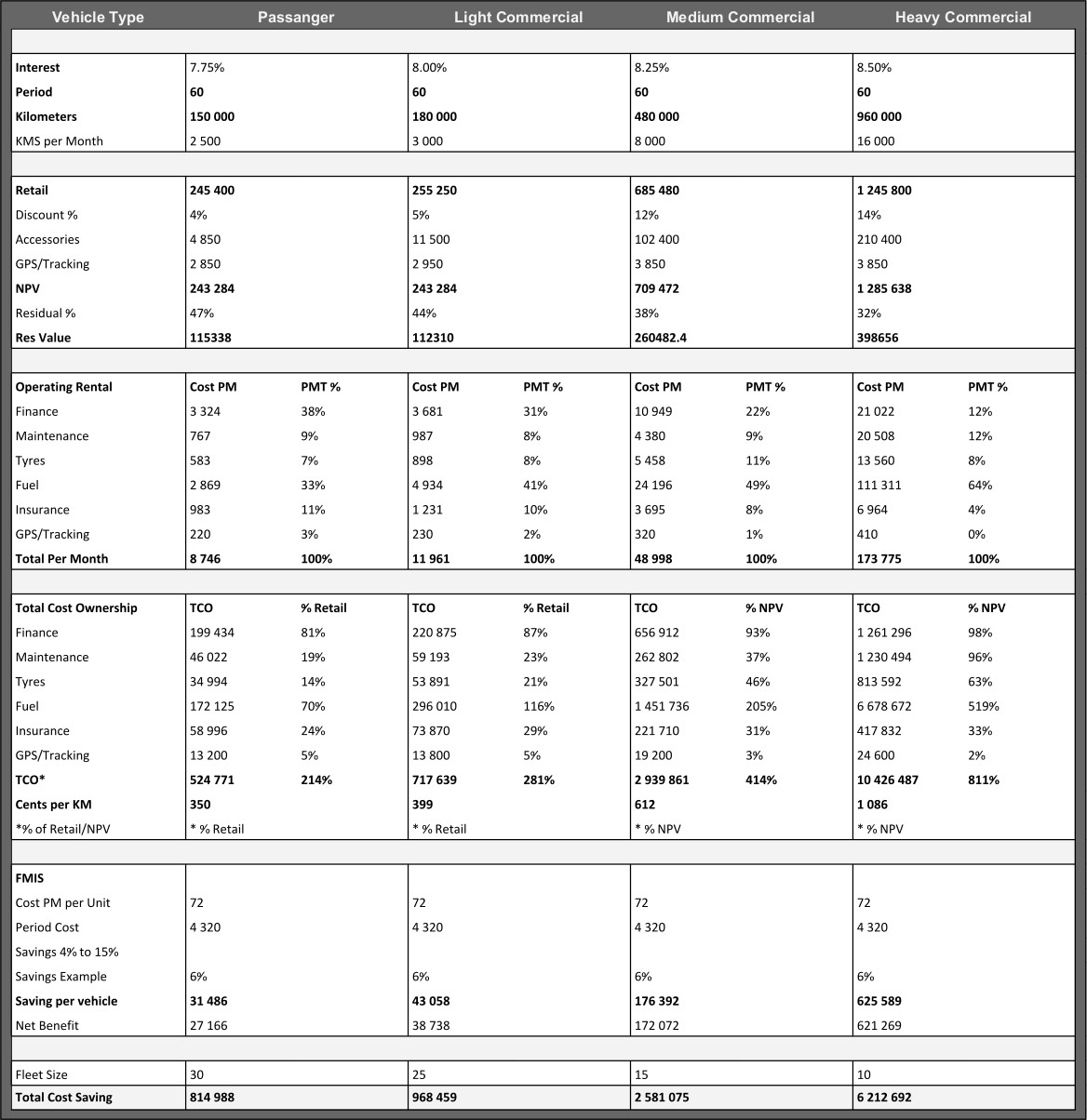The real and actual Total Cost of Ownership (TCO) and Cents per Kilometre (CPK) costs of vehicles selected, for use in a fleet, have always been under the spotlight.
Not all fleet owners have access to all the cost contributors that influences an objective decision.
This is not to say, that there are not fleet owners who have this down to 3 decimal places.
The bigger and more sophisticated fleet operators have historical data end current actual costs and methodologies to determine the TCO and CPK very accurately.
This examples below are to generically show some of the expenses and their contributing percentages to the costs of operating a fleet vehicle.
The contributing portions of costs may differ as a percentage, when applied in different applications and areas of operation.
The major contributors to costs are that of Depreciation and Fuel. Maintenance, Tyres, Insurance and a GPS/Tracking device are lesser contributing factors although they must be managed with equal diligence.
Hence a 2% additional discount received upfront, may not be the correct decision should the fuel consumption differ by 4%?
All the contributing factors require evaluation and comparison before a specific brand or model is selected for the fleet.
Taking cognisance of the above it is imperative, that the fleet owner ensures, that there are company policies, measuring methodologies, safety and risk management processes, driver training and improvement principles in place.
A Fleet Management Information System (FMIS) can measure all the Fleet Cost contributors. Savings between 4% to 15% or more can be achieved. which will ensure an optimum Return on Investment (ROI).
The FMIS consolidates all expenses and information on one platform. Expenses from Finance, Depreciation, Maintenance, Tyres, Fuel, Insurance and GPS/Tracking collectively influence a vehicles Total Cost of Ownership (TCO) and Cents per Kilometre (CPK).
It is a stated truth that:
“Fleet Costs cannot be improved, nor Risk Factors mitigated unless the behaviour and actions of the Driver can be changed or influenced”
By implementing an FMIS into the fleet operation, all the various reports received from the multiple vendors assisting in the management of a fleet are consolidated in one place.
Fleet Managers or Fleet Owners cannot effectively look at all the various reports received daily, to easily deduct what actions are to be taken.
There is simply too much information available. By making use of a fully integrated FMIS all the actions and influencers of Costs can be managed. It is not possible to manage 300 incidents a day, but 15 exceptions can be managed easily and effectively.
The simple actions of speeding, acceleration, harsh braking and lack of sleep/driver fatigue – measured against excessive maintenance, tyre wear, fuel consumption, fines received and accident incidents per driver – being “Flagged as an Exception”, will drive the correct actions to be taken. These actions and corrections happen daily and not at the end of the month when it is too late.
Linked to the above are the Key Performance Indicators (KPI’s) that are set to measure Personal Performance, areas or Training required, Safety and Risk-mitigating items and overall company improvements to bolster the ROI.
Fleet Management is an applied science, that requires the commitment and support of Top Management. This allows for correct training to be done, the installation of the correct tools and ensures an improved safer and more cost-efficient Fleet Operation.
Put this in Perspective
The cost of a reputable and state of the art FMIS, combining all the measurement areas with Vehicle and Driver information on one platform, will improve fleet expenditure by 4% to 15%.
The average cost of the FMIS varies from R 70 to R 220 ex VAT per vehicle per month, depending on the FMIS management services required.
This cost of a FMIS is negligible compared to the BIG picture.
Total Cost of Ownership(TCO) and Cents per Kilometer(CPK) Example
Should you require any further information or assistance kindly contact us:


